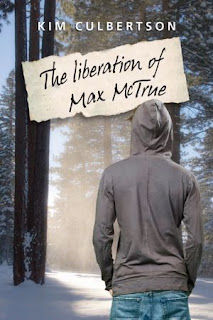 Press, 2007) and her second YA novel Instructions for a Broken Heart (2011) which was named a Booklist Top Ten Romance Title for Youth: 2011. Culbertson's short fiction has appeared in Cicada, Canary, and The Smoking Poet. When she's not writing for teens, she's teaching them. She's a college advisor and teaches creative writing and English at Forest Charter School in Northern California. Culbertson wrote her eBook novella The Liberation of Max McTrue for her students who, over the years, have taught her much more than she has taught them.
Press, 2007) and her second YA novel Instructions for a Broken Heart (2011) which was named a Booklist Top Ten Romance Title for Youth: 2011. Culbertson's short fiction has appeared in Cicada, Canary, and The Smoking Poet. When she's not writing for teens, she's teaching them. She's a college advisor and teaches creative writing and English at Forest Charter School in Northern California. Culbertson wrote her eBook novella The Liberation of Max McTrue for her students who, over the years, have taught her much more than she has taught them.Recently I asked the author what she was reading. Her reply:
Arcadia by Lauren GroffVisit Kim Culbertson's website, Facebook page, and Twitter perch.
Like, well, everyone, I read Utopia in college and I’ve always been drawn to the idea of an idealized community. In Arcadia, Groff explores one such community through the eyes of beautiful Bit, who starts the novel as a boy, held in the arms of his mercurial mother, Hannah, and ends the novel a man – somewhere in a not too distant future. This book is lush and dreamy, and for me it triumphed because of Bit. Lovely Bit – who sees the world differently because he notices beauty in small things and loves people even when they are hard. Arcadia is a meditation on the line between
community and freedom, and the ache that grows from needing people, but also knowing they often let you down.
The Fault in Our Stars by John Green
Okay, John Green. You got me. Yes, I needed Kleenix. Yes, you’re so funny and sweet and quirky and the best of what’s being written in YA right now. I bow at the feet of your YA-ness. Read this book. This book made me want to smell my daughter’s hair and line up all her shoes in the entryway.
“Self-Reliance” by Ralph Waldo Emerson and American Transcendentalism by Philip F. Gura
I just finished a short Transcendentalism unit in the high school English class I teach. Perhaps one of my student’s summed it up best when he lined his notes with this, “Emerson, Emerson – yes. Right. Love this. Love this guy.” Me too.
Ex Vivo: out of the living body (poems) by Kirsten Casey
Kirsten is in my writing group, a diligent mother of three, and, oh yeah – one of the most interesting, vivid poets I’ve read in a long time. A sample: “Every word is a vital organ.”
Entertainment Weekly
While it’s true the novel I’m currently working on is about celebrity so this technically counts as research, who am I kidding? I’d be reading EW anyway. And Vanity Fair. Damn, I love me some Vanity Fair. A good afternoon is filtered light through the window, a latte, and a few-days-old Vanity Fair (it takes a few days for that perfume smell to dwindle).
--Marshal Zeringue





















































